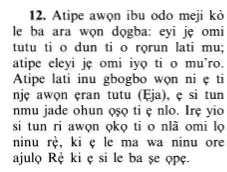35vs12
Select any filter and click on Go! to see results
وَمَا يَسْتَوِي الْبَحْرَانِ هَذَا عَذْبٌ فُرَاتٌ سَائِغٌ شَرَابُهُ وَهَذَا مِلْحٌ أُجَاجٌ وَمِن كُلٍّ تَأْكُلُونَ لَحْماً طَرِيّاً وَتَسْتَخْرِجُونَ حِلْيَةً تَلْبَسُونَهَا وَتَرَى الْفُلْكَ فِيهِ مَوَاخِرَ لِتَبْتَغُوا مِن فَضْلِهِ وَلَعَلَّكُمْ تَشْكُرُونَ
Wama yastawee albahrani hatha AAathbun furatun saighun sharabuhu wahatha milhun ojajun wamin kullin takuloona lahman tariyyan watastakhrijoona hilyatan talbasoonaha watara alfulka feehi mawakhira litabtaghoo min fadlihi walaAAallakum tashkuroona
Yoruba Translation

Hausa Translation
Kuma kõguna biyu ba su daidaita: Wannan mai ruwan dãɗi, mai zãƙi, mai sauƙin haɗiya kuma wannan mai ruwan gishiri mai zartsi, kuma daga kõwane, kunã cin wani nama sãbo, kuma kunã fitar da kawa wadda kuke tufantarta, kuma kanã ganin jirãge a cikinsa sunã mãsu gudãna, dõmin ku nħmo daga falalarSa, kuma ɗammãninku zã ku dinga gõdħwa.
Asbabu n-Nuzuul (Occasions of Revelation)
The Blessings and Signs of Allah
Allah says,
وَمَا يَسْتَوِي الْبَحْرَانِ هَذَا عَذْبٌ فُرَاتٌ سَائِغٌ شَرَابُهُ ...
And the two seas (kinds of water) are not alike: this is palatable, sweet and pleasant to drink,
Allah says, pointing out His mighty power in creating different things, how He has created the two seas (kinds of water). The fresh, palatable sea (kind of water) refers to the rivers which flow among people, rivers great and small according to people's needs in all regions and areas and lands. This water is sweet and palatable for whoever wants to drink it.
... وَهَذَا مِلْحٌ أُجَاجٌ ...
and that is salty and bitter.
means, unpalatable.
This is the ocean in which the big ships sail, and is salty and undrinkable.
Then Allah says:
... وَمِن كُلٍّ تَأْكُلُونَ لَحْمًا طَرِيًّا ...
And from them both you eat fresh tender meat,
meaning, fish.
... وَتَسْتَخْرِجُونَ حِلْيَةً تَلْبَسُونَهَا ...
and derive the ornaments that you wear.
This is like the Ayah:
يَخْرُجُ مِنْهُمَا الُّلؤْلُؤُ وَالمَرْجَانُ
فَبِأَىِّ ءَالاءِ رَبِّكُمَا تُكَذِّبَانِ
Out of them both come out pearl and coral. Then which of the blessings of your Lord will you both (Jinn and men) deny! (55:22-23)
... وَتَرَى الْفُلْكَ فِيهِ مَوَاخِرَ ...
And you see the ships cleaving,
means, they travel through it, plowing through the water with their beak-shaped bows.
Mujahid said,
The wind drives the ships, and the wind cannot drive any ships except the big ones.
...لِتَبْتَغُوا مِن فَضْلِهِ ...
that you may seek of His bounty,
means, through your journeys to engage in trade from one land to another.
... وَلَعَلَّكُمْ تَشْكُرُونَ ﴿١٢﴾
and that you may give thanks.
means, that you may give thanks to your Lord for subjugating this mighty creation -- the sea -- to you, so that you can travel through it as you wish and go wherever you want, and nothing stops you؛ His power has subjugated for you whatever is in the heavens and on earth, and all of this is by His grace and mercy.
يقول تعالى منبها على قدرته العظيمة في خلقه الأشياء المختلفة خلق البحرين العذب الزلال وهو هذه الأنهار السارحة بين الناس من كبار وصغار بحسب الحاجة إليها في الأقاليم والأمصار والعمران والبراري والقفار وهي عذبة سائغ شرابها لمن أراد ذلك " وهذا ملح أجاج " أي مر وهو البحر الساكن الذي تسير فيه السفن الكبار وإنما تكون مالحة زعافا مرة ولهذا قال " وهذا ملح أجاج " أي مر ثم قال تعالى : " ومن كل تأكلون لحما طريا " يعني السمك " وتستخرجون حلية تلبسونها " كما قال عز وجل " يخرج منهما اللؤلؤ والمرجان فبأي آلاء ربكما تكذبان " وقوله جل وعلا " وترى الفلك فيه مواخر " أي تمخره وتشقه بحيزومها وهو مقدمها المسنم الذي يشبه جؤجؤ الطير وهو صدره وقال مجاهد تمخر الريح السفن ولا يمخر الريح من السفن إلا العظام وقوله جل وعلا " لتبتغوا من فضله " أي بأسفاركم بالتجارة من قطر إلى قطر . وإقليم إلى إقليم " ولعلكم تشكرون " أي تشكرون ربكم على تسخيره لكم هذا الخلق العظيم وهو البحر تتصرفون فيه كيف شئتم وتذهبون أين أردتم ولا يمتنع عليكم شيء منه بل بقدرته قد سخر لكم ما في السماوات وما في الأرض الجميع من فضله ورحمته .
"وما يستوي البحران هذا عذاب فرات" شديد العذوبة "سائغ شرابه" شربه "وهذا ملح أجاج" شديد الملوحة "ومن كل" منهما "تأكلون لحما طريا" هو السمك "وتستخرجون" من الملح وقيل منهما "حلية تلبسونها" هي اللؤلؤ والمرجان "وترى" تبصر "الفلك" السفن "فيه" في كل منهما "مواخر" تمخر الماء أي تشقه بجريها فيه مقبلة ومدبرة بريح واحدة "لتبتغوا" تطلبوا "من فضله" تعالى بالتجارة "ولعلكم تشكرون" الله على ذلك
قال ابن عباس : " فرات " حلو , و " أجاج " مر . وقرأ طلحة : " هذا ملح أجاج " بفتح الميم وكسر اللام بغير ألف . وأما المالح فهو الذي يجعل فيه الملح . وقرأ عيسى وابن أبي إسحاق " سيغ شرابه " مثل سيد وميت .
I'raab - grammatical analysis of the Qur'an
«وَما» الواو عاطفة وما نافية «يَسْتَوِي الْبَحْرانِ» مضارع وفاعله المرفوع بالألف لأنه مثنى «هذا عَذْبٌ» اسم الإشارة مبتدأ وعذب خبره والجملة حالية «فُراتٌ» صفة لعذب «سائِغٌ شَرابُهُ» سائغ خبر مقدم وشرابه مبتدأ مؤخر والهاء مضاف إليه والجملة صفة ثانية لعذب «وَهذا مِلْحٌ» مبتدأ وخبره والجملة معطوفة «أُجاجٌ» صفة للملح والأجاج هو شديد الملوحة «وَمِنْ كُلٍّ» متعلقان بالفعل بعدهما «تَأْكُلُونَ» مضارع مرفوع بثبوت النون والواو فاعل «لَحْماً» مفعول به «طَرِيًّا» صفة والجملة معطوفة «وَتَسْتَخْرِجُونَ حِلْيَةً» الواو عاطفة ومضارع وفاعله ومفعوله والجملة معطوفة «تَلْبَسُونَها» مضارع وفاعله ومفعوله والجملة صفة «وَتَرَى الْفُلْكَ» مضارع ومفعوله وفاعله مستتر والجملة معطوفة «فِيهِ مَواخِرَ» الجار والمجرور متعلقان بالحال مواخر «لِتَبْتَغُوا» مضارع منصوب بأن المضمرة بعد لام التعليل وعلامة نصبه حذف النون ولام التعليل وما بعدها في محل جر ومتعلقان بمواخر «مِنْ فَضْلِهِ» متعلقان بتبتغوا والهاء مضاف إليه «وَلَعَلَّكُمْ» لعل واسمها «تَشْكُرُونَ» مضارع وفاعله والجملة خبر لعل والجملة معطوفة
